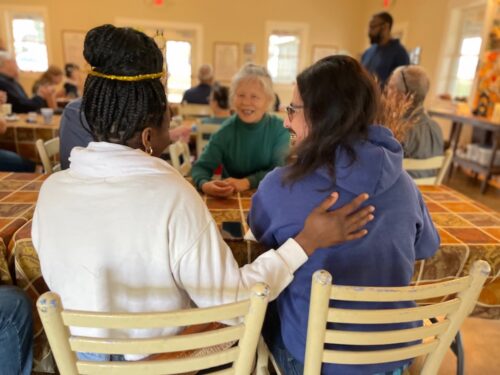
Koinonia Farm celebrated 80 years of commitment to a simple life, a common purse and relationships that cross racialized boundaries on November 26.
The vision of two couples – Clarence and Florence Jordan and Martin and Mabel England – the land continues to extend a call to Christians who feel compelled to live in intentional community.
Founded in 1942 in Americus, Georgia, the integrated community of European and African Americans first caught the attention of their neighbors and then the Ku Klux Klan, who paid them a few visits. Preceding the civil rights movement, it was even visited by Martin Luther King Jr.
“Here was a son of the Old South, a white Baptist minister doing what we were only talking about. I went to Koinonia to see it for myself and couldn’t wait to leave because I was sure that the Klan would show up and kill us both,” King said.
Clarence Jordan seemed almost to prefer that the Klan visit. “I would rather face the frantic, childish mob, even with their shotguns and buggy whips, than the silent, insidious mob of good church people who give assent to boycott and subtle psychological warfare,” he said.
During an economic boycott of the farm in the 1960s, the members shipped pecans throughout the country to sustain the community. Today, it continues to support the work of the ministry with the help of Geneva Brown, the Bakery Coordinator.
(Photo: Starlette Thomas)
On its 75th anniversary, the milestone was marked by the first Clarence Jordan Symposium, which featured nationally known speakers and hundreds of attendees. This year, the community opted for a more intimate gathering, attracting a few dozen people to their open house.
It included guided tours, hayrides, kids’ activities and a viewing of the documentary “Briars in the Cotton Patch: The Story of Koinonia Farm.” It was also Florence’s birthday.
“Happy 80th Koinonia,” read a sheet cake with yellow and white frosting. After the cake was cut in squares, time seemed to fold in half, revealing a look back into this old fellowship.
Across tables filled with paper plates, cups and Uno cards, people shared what had brought them to Koinonia Farm. They talked about their family’s generations of service and how long they had been friends with each other. They also swapped memories of Clarence Jordan passed down to them.

(Photo: Starlette Thomas)
The conversation starters emphasized relationships. “How are you connected to Koinonia? Who do you know from Koinonia?”
There was also robust discussion about its future and the implications of Jordan’s work today. At every turn, there were testimonies of calling, of the farm providing a path of discernment, of finding their home on the farm.
“What should always be at the heart of Koinonia … Clarence Jordan talked about God always pursuing us in love. Likewise, we should actively pursue each other in love,” Steven Krout said. While he is the Products Coordinator and the Come, Stay Awhile and Serve Coordinator, he prefers to be called a member.
“Koinonia Farm today means radical hospitality and sharing. My hope is that more and more people come to love that same call and join us,” shared Elizabeth Dede. She is the Ministries Coordinator but also wanted to be identified as a member of the community.

(Photo: Starlette Thomas)
The work of the farm continues with Michael Neevel, a friend of the community, moving the mobile chicken coop, which held more roosters than he wanted. Neevel also made a tour bus out of a tractor for the hayride, making stops at Clarence’s shack, which he used for writing, the Koinonia chapel and the grape vineyard.
Norris Harris, a long-time member of the community and an African Methodist Episcopal pastor, shared farming techniques to ensure that the farm would produce the perfect scuppernongs and muscadines. No longer done by hand, we also learned about the heavy farming equipment required to shake the trees of their pecans and to collect them.
Five hundred acres of farmland, the members of this “demonstration plot” shook the dust off their feet in a segregated world and lived in their own.
A new book by Plough Publishing, The Inconvenient Gospel: A Southern Prophet Tackles War, Wealth, Race, and Religion, aims to introduce a new generation to the work and witness of Clarence Jordan, best known for The Cotton Patch Gospel and his stand against capitalism, militarism and racism.

(Photo: Starlette Thomas)
“Clarence Jordan’s work today means that it keeps the tenets of unwinding racism and all of its components. It gives accountability for white Christians and all Christians everywhere that they need to live their values versus talking about their values, that it’s how they are executing on their faith, not just that they are just simply professing their faith,” Dionne Henderson, an intern at Koinonia Farm, said.
Eighty years later, people are still talking about Clarence Jordan and seeking to demonstrate his vision of community. That green-thumbed preacher might have put more in the soil at Koinonia Farm than he let on.


